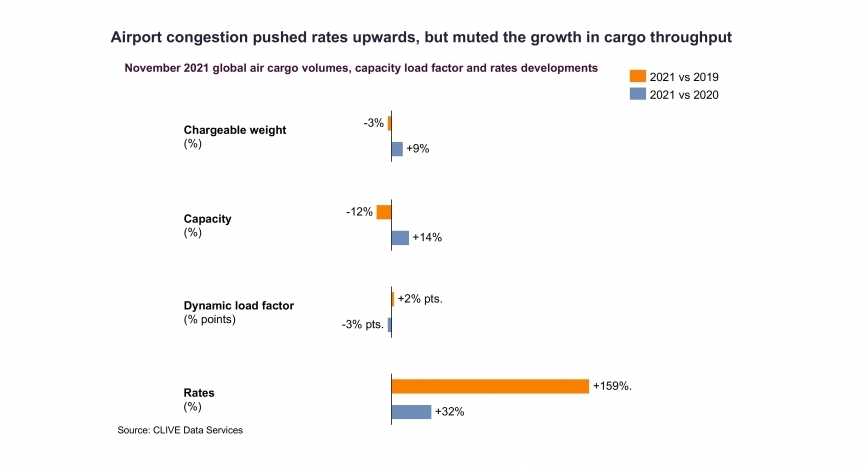Congestion in airports reverses traditional trend of air cargo in Nov
Congestion on the ground muted air cargo’s growth in November, with volumes falling by -1.2 percent versus October, reversing the trend traditionally seen in the peak build-up to Christmas, according to the latest global air cargo market intelligence from industry analysts, CLIVE Data Services.

December 3, 2021: Congestion on the ground muted air cargo’s growth in November, with volumes falling by -1.2 percent versus October, reversing the trend traditionally seen in the peak build-up to Christmas, according to the latest global air cargo market intelligence from industry analysts, CLIVE Data Services.
Last month’s fall in volumes compared to October 2021 came despite a +0.5 percent rise in capacity, while overall air cargo rates climbed +8 percent in November month-on-month.
Compared to November 2019, last month recorded a 3 percent decline in demand, but overall air cargo rates remained buoyant at +159 percent. Capacity versus two years ago was -12 percent, lifting CLIVE’s ‘dynamic load factor’ – based on both the volume and weight perspectives of cargo flown and capacity available to produce a true indicator of airline performance – up 2 to 66 percent.
Europe to North America market data for the last week of October versus the third week of November, prior to the Thanksgiving holiday in the US, showed capacity down 7.3 percent and load factor up 4 to 86 percent. Airfreight rates for this market consequently saw a 10 percent increase. Any hope that the opening up of transatlantic services would offer some relief to the cargo market was quickly eradicated by increased volumes of passenger baggage.
“Typically, we would expect November volumes to be higher than October volumes, but that’s not reflected in this latest volume and load factor data. We started to see the growth slowing down at the end of October. The global load factor for November was 2 percent pts lower than in October, which is quite remarkable,” said Niall van de Wouw, CLIVE’s managing director.
“This unexpected month-over-month shift is not due to a lack of demand, it is almost certainly because cargo cannot be pushed efficiently through the system. This is also what we’ve seen reported in the oceanfreight market at US west coast ports. Labour shortages are a factor in all sectors, but this is especially having an impact on such a labour-intensive industry as airfreight, especially on the ground. Airport congestion seems to be the price the industry has to pay for the lack of investment in, and appreciation of, cargo handling,” he added. “The current inefficiencies on the ground must have opportunity costs for airlines, forwarders and shippers alike, because cargo will be missing flights. Two months ago, we described the air cargo market as ‘fragile’ heading into the traditional peak season, and this fragility is being visualised on social media through airport movies showing countless pallets and containers waiting on the tarmac.”


